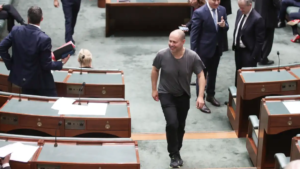Home » Commentary » Opinion » Endless fiscal stimulus can’t be the new normal
· Financial Review
 Governments everywhere are being urged to take advantage of near-zero interest rates, throw caution to the wind, shrug off the size of deficits and spend freely. Many of them took this advice in the corona-crisis conditions of 2020.
Governments everywhere are being urged to take advantage of near-zero interest rates, throw caution to the wind, shrug off the size of deficits and spend freely. Many of them took this advice in the corona-crisis conditions of 2020.
Whether or not they were right to do so then, they would be ill-advised to remain on the same path in 2021. It is time to think about a path back to fiscal consolidation, discipline, and responsibility – what is pejoratively labelled “austerity”.
This doesn’t mean that surplus or even balanced budgets are imminent, but it does mean rejecting the notion that debt no longer matters and that fiscal stimulus should be part of the new normal.
There are many expert voices arguing against a shift away from fiscal laxity. Writing on these pages on Wednesday, for example, professors Richard Holden and Bruce Preston (“Perverse logic of the push for higher interest rates”) advocated adherence to expansionary fiscal policy until unemployment falls below 4 per cent.
They do not specify what expenditure or tax policies should be changed to achieve this, but there is no shortage of ideas from other social engineers and big spenders that are as much about permanent enlargement of the public sector as they are about fiscal stimulus.
The permissive approach to fiscal management within which they are framed is a recipe for waste on low-return, inefficient schemes and projects, and a mountain of public debt that will handicap the prosperity of future generations, severely limit future budget flexibility, and reduce the fiscal headroom for the next crisis.
We are already well along the road to that unhappy situation. The latest round of federal, state and territory budgets points to general government debt more than doubling from $800 billion to $1.75 trillion in the five years to 2024.
It is difficult to imagine a more negative setting for business confidence and investment than indefinite fiscal indulgence.
According to Holden and Preston, fiscal policy should be given an overriding “mandate” to drive unemployment below 4 per cent solely through whatever amount of fiscal stimulus it takes.
Knowingly or not, these economists have unearthed a massive failure of Australian economic management over much of the past half century. In the 43-year history of monthly labour force statistics, the unemployment rate has never been below 4 per cent, and has been exactly 4 per cent just twice. That is two months out of 516.
Now, we are told, we can do better than anything in that 43-year record solely by keeping the fiscal pedal to the metal for as long as it takes, without lifting a finger to pursue anything like labour market reform or other microeconomic reform. It’s all about macroeconomic stimulus.
Comparing this fiscal mandate with the Reserve Bank’s assignment of monetary policy to an inflation target overlooks not only the complexities monetary policy has faced in recent years, but also the inherently greater political intensity and multidimensional character of fiscal policy. It cannot be one-dimensional.
There is nothing wrong with aspiring to an unemployment rate below 4 per cent, but attempting to achieve it through repeated rounds of fiscal stimulus has more than a whiff of unrealistic gimmickry.
Such an approach would trigger negative dynamics, and in all likelihood self-destruct before it reached its target.
Any vision of a low-unemployment Australia must recognise that it won’t be achieved as long as business investment (meaning investment in plant and equipment, buildings, research and development, and innovation) remains depressed – as it has been since before the pandemic.
Getting out of this depression will not be easy. It requires attention to many aspects of regulation and taxation. But it is difficult to imagine a more negative setting for business confidence and investment than indefinite fiscal indulgence and the expectations it would bring of ultimately higher taxes. There is a lot of truth in the adage that today’s deficit is tomorrow’s tax increase.
Scott Morrison’s government and economic ministers have been sounding a little more hawkish on fiscal policy of late. They are right to insist on JobKeeper coming to an end next month. That, and the termination of other temporary props, is really the beginning of fiscal consolidation – though ministers don’t describe it that way.
The latest official statement of fiscal policy is that the government won’t even think about budget repair until unemployment has dropped “comfortably below” (whatever that means) 6 per cent.
Whatever can be said about the economics of this formula, it is politically convenient, as it means putting off even talking about fiscal nasties until after the next election. But the next budget – less than three months away – is not too soon to start mapping a path back to balanced budgets.
The last budget and the Parliamentary Budget Office’s medium-term fiscal projections point to a Commonwealth budget deficit of 1 per cent to 2 per cent of GDP persisting to 2030 and beyond. This should not be accepted as the new normal.
Endless fiscal stimulus can’t be the new normal